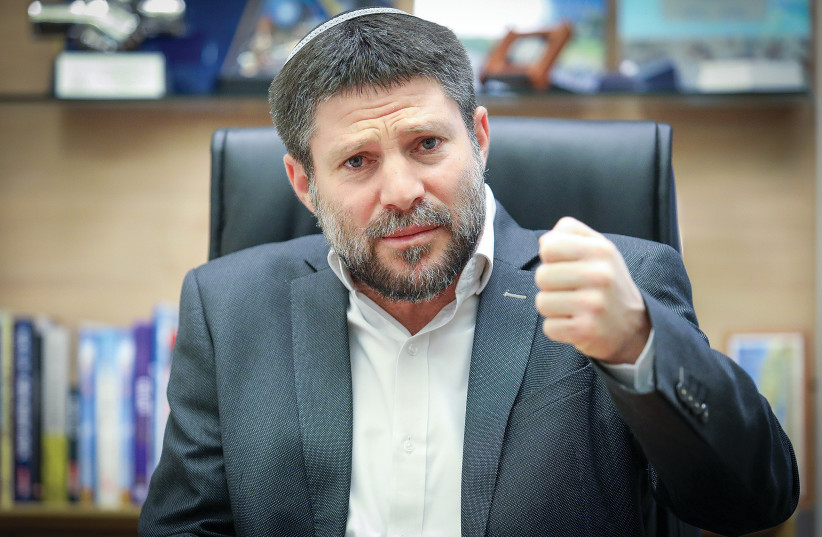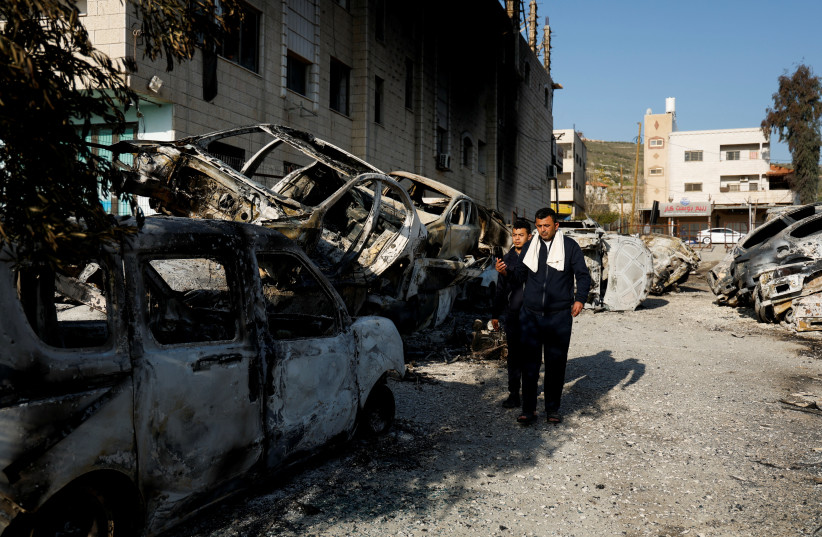“We all make mistakes, but the biggest mistake we can make is to not learn from them,” goes an old saying that it is a shame Finance Minister Bezalel Smotrich never heard.
Or, if he heard, never internalized.
Oy, Smotrich.
His deplorable comment last week that Israel should “erase” Huwara, continues to make waves.
Not small waves, but big ones. Tidal waves.
Despite what its worst enemies say, Israel does not “wipe out” Palestinian cities. Yet with one unthinking comment, Smotrich created the impression that the Jewish state might consider this.

With one unthinking comment, he weakened Israel’s arguments about Palestinian incitement, because now anytime Israel demands that the Palestinians put an end to incitement in school books or TikTok, the response will be: “What about Smotrich.”
With one unthinking comment, he continued to shift the focus from the point-blank murderer of two Israeli brothers in broad daylight on the main street in Huwara, to fear for the safety of the residents of Huwara (a focus that shifted immediately because of the Jewish vigilante rampage in Huwara after the terror attack).
Condemnations of Smotrich’s statement rolled in from everywhere – the US, Europe, the Arab world, American Jewish organizations – and Washington is reportedly considering not issuing the finance minister a visa to enter the country and attend an Israel Bonds event. (Forget about a meeting with US officials in Washington, that is entirely out of the question.)
And what is so frustrating is that all this opprobrium is much ado about nothing. Not “nothing” in the sense that Smortrich did not make an idiotic, unconscionable statement. He did. But “nothing” in the sense that there is nothing behind his comment. Israel is not going to wipe out a Palestinian city. It’s nonsense.
But it’s nonsense that takes on a life of its own.
After Smotrich made his comment, the State Department spokesman called the comment “repugnant” and “disgusting,” leading to fierce denunciations and condemnations from around the globe.
Smotrich on Saturday night walked back his comments, but not before US Ambassador Tom Nides reportedly said that he would throw Smotrich off an airplane if he were on the flight with him to America. Prime Minister Netanyahu alluded to Nides’ comment in a Hebrew tweet on Sunday noting that Smotrich admitted he misspoke and that his words were inappropriate. The prime minister did not, however, mention Nides’ comment in an English tweet he posted about the matter.
And all this reflects a more significant phenomenon: the inordinate amount of time spent in this country dealing with foolish and reckless statements made by public figures; the hunt for reactions; the condemnations and demand for retractions; and then the appraisal of those condemnations and retractions.
X says Y, and then Z demands that A condemn it, and when A does condemn it, this condemnation is dismissed by B as not being sincere enough. It’s ample material to fill a quarter of an hour-long news program, and often it does.
And all that could be avoided if the foolish statement was never released into the world in the first place.
Israel's Left and Right both make foolish, incendiary and reckless statements
Smotrich should know that, which takes us back to the lesson he never learned about the biggest mistake being an inability to learn from previous mistakes.
This was not Smotrich’s first rodeo. He has made public statements in the past – about gays and Arabs – that he has come to regret and which continue to dog him to this day. But those comments were made before he was a politician, and before he was a senior minister, so – while offensive – they had less of an impact on the entire state.
Now he is speaking as a minister of the State of Israel. And as the minister, his words have weight and significance and are taken more seriously by those around the world. Smotrich has apparently yet to internalize that he is a senior minister who sits in the security cabinet making life-and-death decisions and is responsible for guarding his tongue at all times. His comments often give the impression that he thinks his audience is a Religious Zionist Party parlor meeting in Kedumim.

But it is not only Smotrich. Along with last week’s terrorism, the rampage in Huwara, the summit in Aqaba, and the judicial reform, the country’s news cycle was also dominated by Otzmat Yehudit MK Tzvika Fogel’s call for Huwara to be “closed and burned,” as well as Yair Netanyahu’s tweet, since deleted, calling the judicial reform protesters “terrorists.”
Each of those comments triggered denunciations, then explanations, then more condemnations. Yair Netanyahu’s tweet featured prominently in some of the speeches at Saturday night’s protests, just adding more fuel to an already raging fire.
The dynamic of witless comments or social media posts taking on a life all their own is not solely the domain of the Right. Former prime ministers Ehud Barak and Ehud Olmert, as well as Tel Aviv Mayor Ron Huldai, have all contributed to the crazy-statement-driving-the-news syndrome in recent weeks. Barak when likening President Isaac Herzog to Neville Chamberlin becuase he is seeking a compromise; Olmert when saying that war is waged not through speeches but in “hand-to-hand” battle; and Huldai saying that dictatorships only return to becoming democracies through bloodshed.
Too much time and energy in this country has been spent of late dealing with the fallout from foolish comments or social media posts that should never have been said or written. In these overheated days, what Smotrich and others need to do before making what they must realize are outlandish comments is to take a moment and ask themselves, “Is this really something I need to say?”
